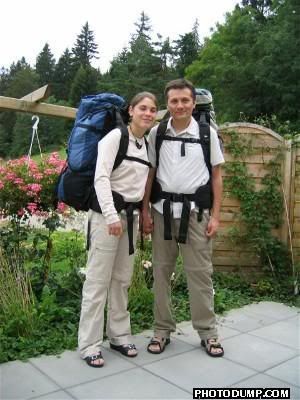Thursday, July 14, 2005
Brunei
Some Background Information
Brunei is a small and wealthy sultanate on the north-western coast of Borneo, entirely surrounded by Sarawak. Its population is 10 times smaller than Singapore, for a surface that is 10 times bigger. In other words, 315'000 inhabitants on a surface roughly the size of the canton of Berne. Most people live near the coast, the hinterland is left to the jungle.
Brunei wasn't always of such modest size. During the 15th and 16th centuries, it was a considerable regional power who dominated the whole of Borneo, the island of Palawan and the Sulu archipelago. Islam had already reached its shores and it was an important trade port on the sea route between China and India.
The decline coincided with the arrival of the European colonial powers. The southern part of Borneo (today the Indonesian province of Kalimantan) was lost to the Dutch. In the 17th century, Brunei's influence in the Philippines waned. The weakness and internal struggles for power of the royal family allowed the Brookes to nibble off Sarawak, and Sabah to be leased to foreign companies. The Sultanate eventually became a British protectorate in 1888.
In 1929, the prospects of a Brunei on the verge of bankrupcy got suddenly much brighter when oil was discovered in Seria. In 1959, Brunei achieved self-government, at the insistence of Britain who was then steadily decolonising in Asia and Africa.
Below, a view of the Shell oil refinery in Seria. Nowadays, most bruneian oil is pumped from offshore platforms and natural gas provides non-negligeable additional income.
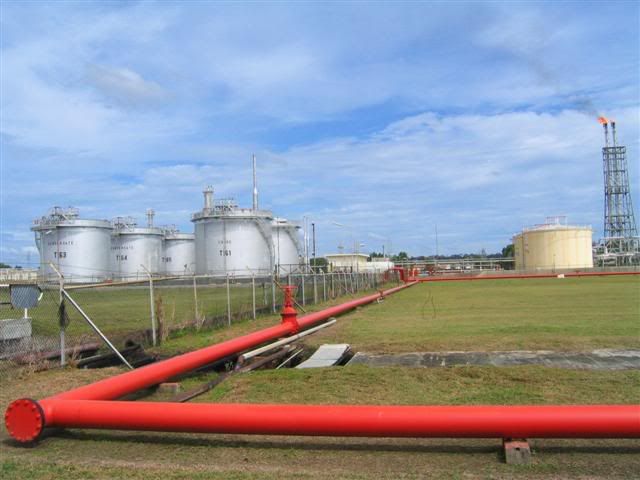
1962-1963 were eventful years who saw the first and last democratic elections in Brunei, a pro-democratic uprising crushed by the british Gurkha troops, the subsequent banning of political parties and the refusal to enter the Malaysian Federation following disagreements over the distribution of oil and gas revenues (which Brunei was determined to keep for itself) and concern about loss of power of the royal family.
Brunei remained a British protectorate until the not so eagerly awaited independence in 1984, which brought with it few perceptible changes for the people. Political parties remain banned. State ministries essentially remain in the hands of members of the royal house and trusted members of a tightly knit elite.
A bigger impact on society was made by the current head of religious affairs, who entered office in the early 1990's. Nearly everything un-islamic got banned (alcohol sale, discotheques, lotteries, beauty contests). Even Malaysian halal chicken, which is not halal enough (or most probably because of vested interests)! But this tendency might soon be reversed, or at least halted. The recent ousting of the integrist minister of education, who enforced headscarfs on all female pupils, wether muslim or not, hints towards a more pragmatic future.
Even though, there is not much to complain about for Brunei citizens. The lack of civic rights is compensated by the absence of taxes, free medical services, free schoolarships abroad, cheap housing, a free pilgrimage to Mecca, and many more benefits. And if it gets too boring at home, Malaysia is just at most an hour's drive away...
The Capital
Most travellers just pass through Brunei on their way to Sabah, or Sarawak. At most, they only stop shortly in the capital, Bandar Seri Begawan, to see a couple of mosques and the water village. They can't be blamed, as Brunei presents a very hermetic facade. The lack of public transportation and the high costs of taxis aren't an encouragement to look further. Not to mention the absence of entertainment and life on the streets. Most restaurants close early. Only a few coffee shops where terminally bored youths meet, are opened till past midnight.
Below, a picture of the magnificent Omar Ali Saifuddin mosque behind part of the water village, a taxi-boat in the foreground. Completed in 1958, designed by an Italian architect, the mosque is built of Italian marble, gold mosaic and English stained glass, but with craftsmanship that reflects classical Islamic architecture. The taxi-boats are still the best way to travel to the water village. A night ride at full speed between the pillars and under the low plankways of the village can cause a considerable adrenaline rush, especially when knowing that accidents occur quite frequently!
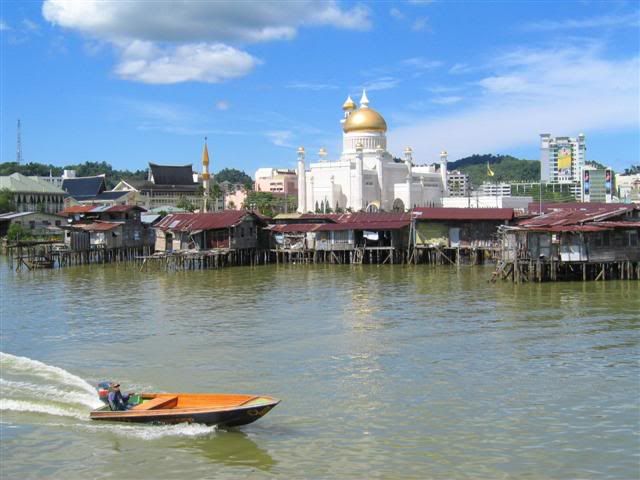
The old mosque is now challenged by the Jame'Asr Hassanal Bolkiah Mosque, built by the current sultan and named after himself. Bigger, more expensive, more ostentatious, stuck between two busy suburban highways, surrounded by parking spaces instead of gardens. It somehow adequately mirrors what the Sultanate has become. But it will never rivalise in class with its predecessor.
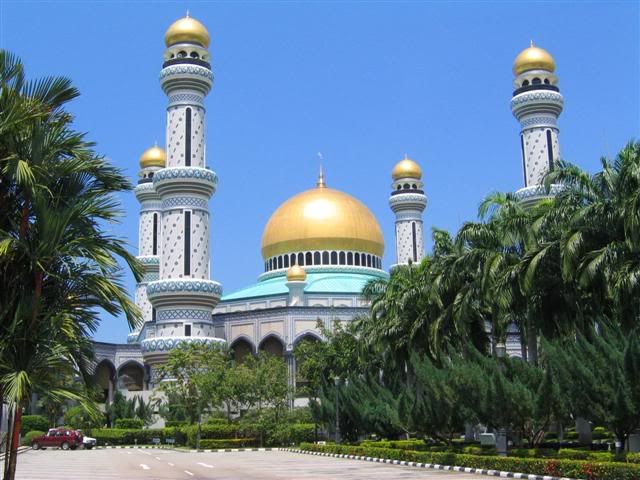
On week-ends, the local "tamu" (market) lights up, when the colourful Kadaians, which are the traditional Bruneian farmers, come to town to sell their wares on the ground between the more permanent vendors.
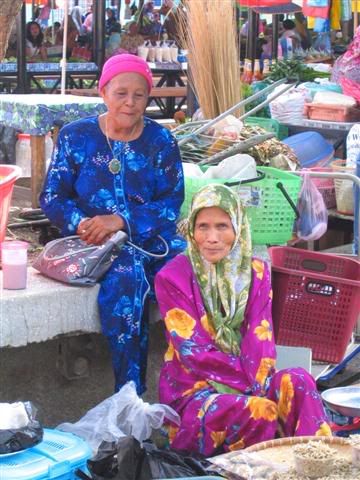
Behind The Scenes
Luckily, we were able to have a look behind the facade. Gilbert has many relatives there who opened us their homes and hearts. People of all ages (from grandchildren to grandparents), backgrounds (Bruneian, Chinese, Eurasian), religions (Muslims, Christians), in towns and villages all over the country... We experienced the warmth of the Brunei lifestyle, in which most social activities are carried out within the family or with friends. The wedding and anniversary scenes are bustling!
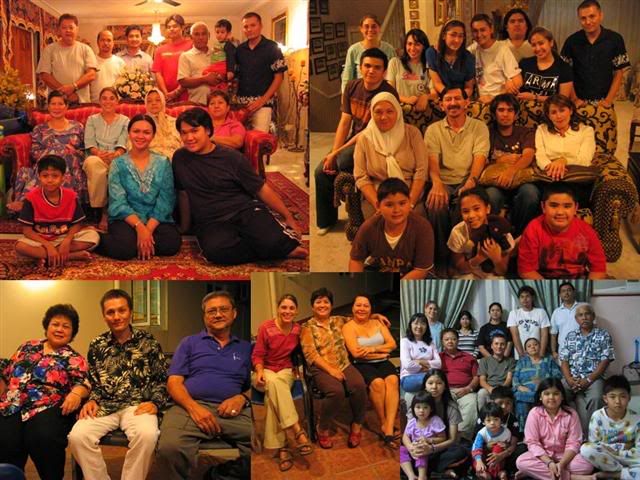
We got generously fed on local cuisine, driven around, and discovered that Brunei was full of ghosts! Beside their usual haunting grounds (graveyards, old houses), they also lurk in TV Studios, resorts, parking lots, governement resthouses... At the time we were there, an epidemic of demonic possession swept over young schoolgirls, making the headlines of the very official "Borneo Bulletin"! Some outbreaks were reported to have happened during religion classes. Rational minds believe this is just a normal case of mass hysteria, a natural step in the evolution of teenage girls. But we find the tabloid version more fun!
In the mid-nineties, Prince Jeffri, minister of finance and Sultan's brother, had big plans for little Brunei. A majestic entertainment complex was to be build at the seaside in Jerudong, near the Prince's residence. A hotel of inimaginable size and luxury, with 24 hours golfing facilities, a swimming pool with a sandy bottom and an artificial beach, a state-of-the-art amusement park linked to the hotel by a tramway, a jetty to receive cruise ships, a marinara for yachts... As the place was just cliffs above small rocky beaches, with no natural harbour, major landscaping was necessary.
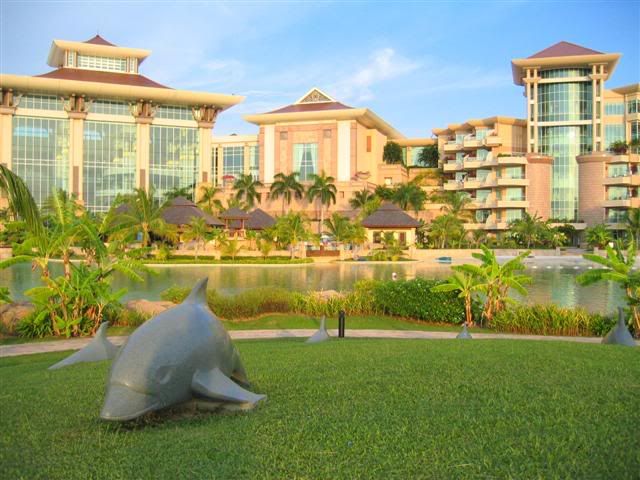
The project was stopped when the Sultan realised 2/3 of the State's fortune (which also happens to be his!) had been used. A trial of unseen proportions took place and many contractors were found guilty of overcharging the credulous and kind-hearted prince for their services.
Prince Jeffri now leads an exiled playboy's life in England. The amusement park, which was free for the first 8 years of its existence, now hardly draws any crowd, is closed half of the time, has an entrance fee, and its rides are not maintained due to lack of funding and know-how. The tramway, the marinara and jetty were never finished. The hotel, a very bold but attractive mixture of Pharaonic, Roman, Renaissance, Neo Grec and Jugendstil elements, aptly named "Empire", has a filling rate of under 10%, despite it offering attractive packages for the locals. One of the wings is permanently closed, and already haunted! Its casino was never allowed to open and the most exciting drink of the menu is "Robinvale Fizzy Grape Juice".
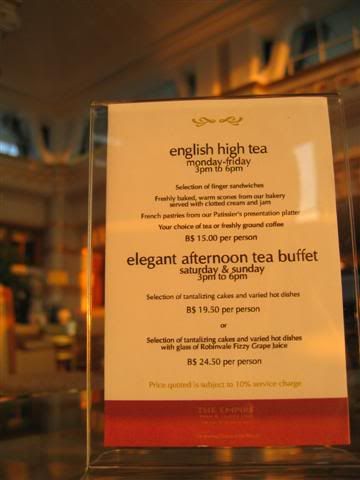
More inland, an atmospheric black lake, Tasek Merimbun, is another wacky highlight of Brunei. Upgraded at great expense to be a recreational area, the place is now empty. Signs warn the adventurous visitor of crocodiles and do not recommend the use of the shaky and unmaintained plankways. Spirits are believed to live in the lake, and sometimes people mysteriously drown in its dark waters.
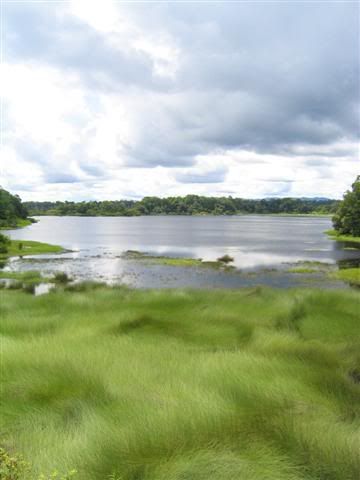
But once again, we were fearless!
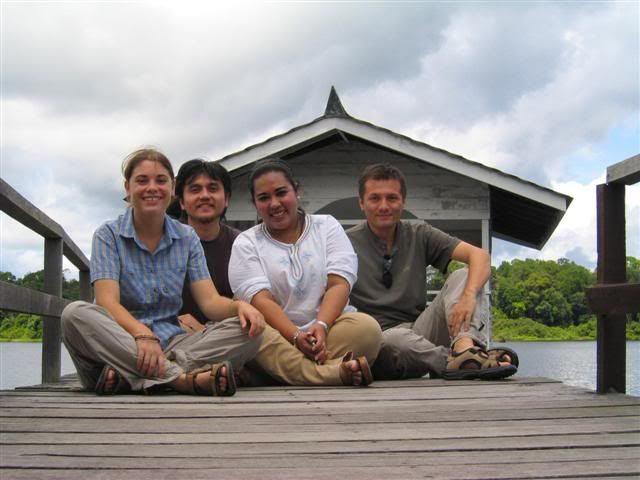
Else, Brunei is very peaceful and laid-back. For example, nobody ever hoots when driving. If police sirens are heard, everyone just calmly moves to the side of the road to let by the speeding black royal limousine and its escort.
And if you ever wondered how a small bruneian town looks, below is a picture of the centre of Kuala Belait, the second biggest city, 85km south of Bandar Seri Begawan, in the oil district. All commercial buildings. Hardly anyone lives there. Most people can afford an individual house in the suburbs, and prefer to go for cheaper shopping in the big malls across the border in Miri.
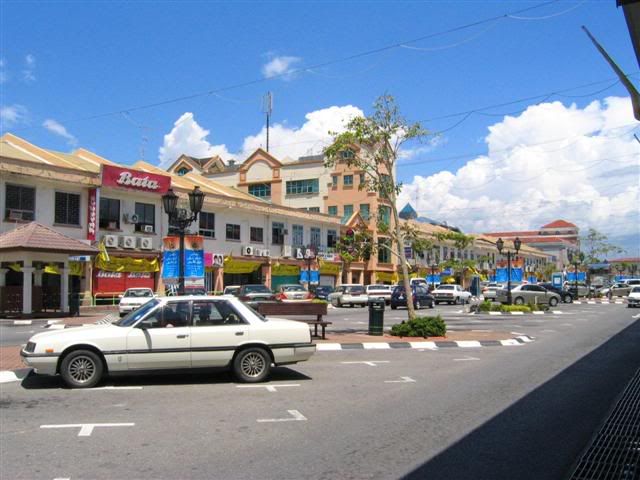
A Grand Birthday
Once again, we were lucky with our (lack of) timing on this trip. We arrived during a particularly festive and active period of the year: His Majesty's birthday. In an apparently spontanious act of allegiance, private companies line the streets with banners of congratulations and hang gigantic posters of the Sultan on tall buildings, while all Bruneians decorate their houses with national flags and colorful lights. And government officers go around to make sure that nobody forgets to be spontanious...
On the morning of the 15th of July, the military parade on the field in the centre of Bandar Seri Begawan marks the opening the festivities. Under a yellow umbrella, the Sultan reviews his perfectly disciplined troops:
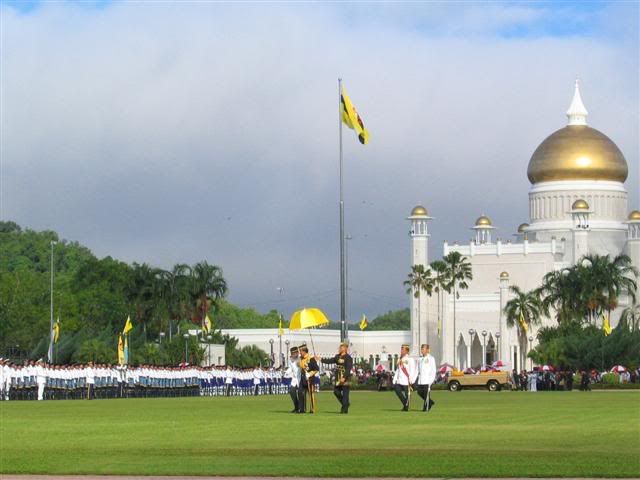
During a month, cultural shows, fireworks and other events take place all over the country. Street vendors can open food stalls and stands. Local bands give open-air concerts. Of course, those fairs are only moderatly animated by Occidental standards. The young Bruneians are not really used to enjoy themselves in public. But still, it was nice!
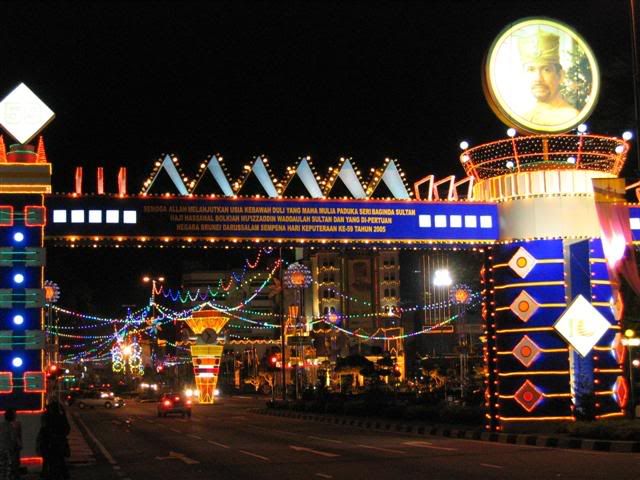
One Year On The Road
All in all, those 3 weeks in the Sultanate nicely marked one year of travelling. Everybody was very patient and kind to us, and helped the best they could. We were freed of the usual traveller's preoccupations of finding food and lodging, and could reorganise ourselves for the rest of our adventures!
Brunei is a small and wealthy sultanate on the north-western coast of Borneo, entirely surrounded by Sarawak. Its population is 10 times smaller than Singapore, for a surface that is 10 times bigger. In other words, 315'000 inhabitants on a surface roughly the size of the canton of Berne. Most people live near the coast, the hinterland is left to the jungle.
Brunei wasn't always of such modest size. During the 15th and 16th centuries, it was a considerable regional power who dominated the whole of Borneo, the island of Palawan and the Sulu archipelago. Islam had already reached its shores and it was an important trade port on the sea route between China and India.
The decline coincided with the arrival of the European colonial powers. The southern part of Borneo (today the Indonesian province of Kalimantan) was lost to the Dutch. In the 17th century, Brunei's influence in the Philippines waned. The weakness and internal struggles for power of the royal family allowed the Brookes to nibble off Sarawak, and Sabah to be leased to foreign companies. The Sultanate eventually became a British protectorate in 1888.
In 1929, the prospects of a Brunei on the verge of bankrupcy got suddenly much brighter when oil was discovered in Seria. In 1959, Brunei achieved self-government, at the insistence of Britain who was then steadily decolonising in Asia and Africa.
Below, a view of the Shell oil refinery in Seria. Nowadays, most bruneian oil is pumped from offshore platforms and natural gas provides non-negligeable additional income.

1962-1963 were eventful years who saw the first and last democratic elections in Brunei, a pro-democratic uprising crushed by the british Gurkha troops, the subsequent banning of political parties and the refusal to enter the Malaysian Federation following disagreements over the distribution of oil and gas revenues (which Brunei was determined to keep for itself) and concern about loss of power of the royal family.
Brunei remained a British protectorate until the not so eagerly awaited independence in 1984, which brought with it few perceptible changes for the people. Political parties remain banned. State ministries essentially remain in the hands of members of the royal house and trusted members of a tightly knit elite.
A bigger impact on society was made by the current head of religious affairs, who entered office in the early 1990's. Nearly everything un-islamic got banned (alcohol sale, discotheques, lotteries, beauty contests). Even Malaysian halal chicken, which is not halal enough (or most probably because of vested interests)! But this tendency might soon be reversed, or at least halted. The recent ousting of the integrist minister of education, who enforced headscarfs on all female pupils, wether muslim or not, hints towards a more pragmatic future.
Even though, there is not much to complain about for Brunei citizens. The lack of civic rights is compensated by the absence of taxes, free medical services, free schoolarships abroad, cheap housing, a free pilgrimage to Mecca, and many more benefits. And if it gets too boring at home, Malaysia is just at most an hour's drive away...
The Capital
Most travellers just pass through Brunei on their way to Sabah, or Sarawak. At most, they only stop shortly in the capital, Bandar Seri Begawan, to see a couple of mosques and the water village. They can't be blamed, as Brunei presents a very hermetic facade. The lack of public transportation and the high costs of taxis aren't an encouragement to look further. Not to mention the absence of entertainment and life on the streets. Most restaurants close early. Only a few coffee shops where terminally bored youths meet, are opened till past midnight.
Below, a picture of the magnificent Omar Ali Saifuddin mosque behind part of the water village, a taxi-boat in the foreground. Completed in 1958, designed by an Italian architect, the mosque is built of Italian marble, gold mosaic and English stained glass, but with craftsmanship that reflects classical Islamic architecture. The taxi-boats are still the best way to travel to the water village. A night ride at full speed between the pillars and under the low plankways of the village can cause a considerable adrenaline rush, especially when knowing that accidents occur quite frequently!

The old mosque is now challenged by the Jame'Asr Hassanal Bolkiah Mosque, built by the current sultan and named after himself. Bigger, more expensive, more ostentatious, stuck between two busy suburban highways, surrounded by parking spaces instead of gardens. It somehow adequately mirrors what the Sultanate has become. But it will never rivalise in class with its predecessor.

On week-ends, the local "tamu" (market) lights up, when the colourful Kadaians, which are the traditional Bruneian farmers, come to town to sell their wares on the ground between the more permanent vendors.

Behind The Scenes
Luckily, we were able to have a look behind the facade. Gilbert has many relatives there who opened us their homes and hearts. People of all ages (from grandchildren to grandparents), backgrounds (Bruneian, Chinese, Eurasian), religions (Muslims, Christians), in towns and villages all over the country... We experienced the warmth of the Brunei lifestyle, in which most social activities are carried out within the family or with friends. The wedding and anniversary scenes are bustling!

We got generously fed on local cuisine, driven around, and discovered that Brunei was full of ghosts! Beside their usual haunting grounds (graveyards, old houses), they also lurk in TV Studios, resorts, parking lots, governement resthouses... At the time we were there, an epidemic of demonic possession swept over young schoolgirls, making the headlines of the very official "Borneo Bulletin"! Some outbreaks were reported to have happened during religion classes. Rational minds believe this is just a normal case of mass hysteria, a natural step in the evolution of teenage girls. But we find the tabloid version more fun!
In the mid-nineties, Prince Jeffri, minister of finance and Sultan's brother, had big plans for little Brunei. A majestic entertainment complex was to be build at the seaside in Jerudong, near the Prince's residence. A hotel of inimaginable size and luxury, with 24 hours golfing facilities, a swimming pool with a sandy bottom and an artificial beach, a state-of-the-art amusement park linked to the hotel by a tramway, a jetty to receive cruise ships, a marinara for yachts... As the place was just cliffs above small rocky beaches, with no natural harbour, major landscaping was necessary.

The project was stopped when the Sultan realised 2/3 of the State's fortune (which also happens to be his!) had been used. A trial of unseen proportions took place and many contractors were found guilty of overcharging the credulous and kind-hearted prince for their services.
Prince Jeffri now leads an exiled playboy's life in England. The amusement park, which was free for the first 8 years of its existence, now hardly draws any crowd, is closed half of the time, has an entrance fee, and its rides are not maintained due to lack of funding and know-how. The tramway, the marinara and jetty were never finished. The hotel, a very bold but attractive mixture of Pharaonic, Roman, Renaissance, Neo Grec and Jugendstil elements, aptly named "Empire", has a filling rate of under 10%, despite it offering attractive packages for the locals. One of the wings is permanently closed, and already haunted! Its casino was never allowed to open and the most exciting drink of the menu is "Robinvale Fizzy Grape Juice".

More inland, an atmospheric black lake, Tasek Merimbun, is another wacky highlight of Brunei. Upgraded at great expense to be a recreational area, the place is now empty. Signs warn the adventurous visitor of crocodiles and do not recommend the use of the shaky and unmaintained plankways. Spirits are believed to live in the lake, and sometimes people mysteriously drown in its dark waters.

But once again, we were fearless!

Else, Brunei is very peaceful and laid-back. For example, nobody ever hoots when driving. If police sirens are heard, everyone just calmly moves to the side of the road to let by the speeding black royal limousine and its escort.
And if you ever wondered how a small bruneian town looks, below is a picture of the centre of Kuala Belait, the second biggest city, 85km south of Bandar Seri Begawan, in the oil district. All commercial buildings. Hardly anyone lives there. Most people can afford an individual house in the suburbs, and prefer to go for cheaper shopping in the big malls across the border in Miri.

A Grand Birthday
Once again, we were lucky with our (lack of) timing on this trip. We arrived during a particularly festive and active period of the year: His Majesty's birthday. In an apparently spontanious act of allegiance, private companies line the streets with banners of congratulations and hang gigantic posters of the Sultan on tall buildings, while all Bruneians decorate their houses with national flags and colorful lights. And government officers go around to make sure that nobody forgets to be spontanious...
On the morning of the 15th of July, the military parade on the field in the centre of Bandar Seri Begawan marks the opening the festivities. Under a yellow umbrella, the Sultan reviews his perfectly disciplined troops:

During a month, cultural shows, fireworks and other events take place all over the country. Street vendors can open food stalls and stands. Local bands give open-air concerts. Of course, those fairs are only moderatly animated by Occidental standards. The young Bruneians are not really used to enjoy themselves in public. But still, it was nice!

One Year On The Road
All in all, those 3 weeks in the Sultanate nicely marked one year of travelling. Everybody was very patient and kind to us, and helped the best they could. We were freed of the usual traveller's preoccupations of finding food and lodging, and could reorganise ourselves for the rest of our adventures!
